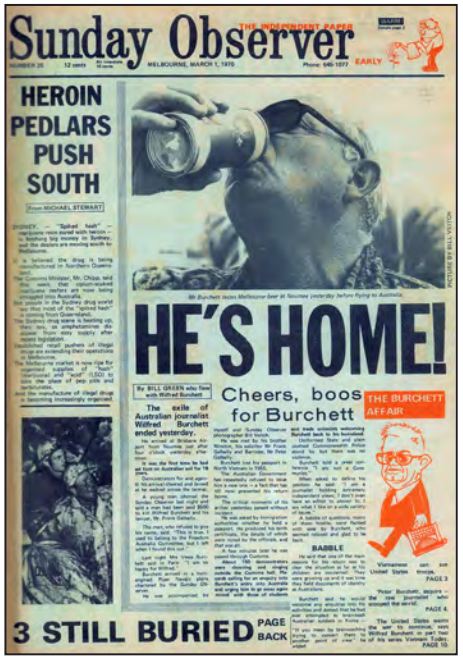
Observer helps ‘Public Enemy Number One’
The Sunday Observer newspaper of March 1, 1970, became part of the story when the paper’s owner, Gordon Barton, funded the flight of banned journalist Wilfred Burchett back into Australia.
News Editor Bill Green wrote the front-page story of how Burchett was flown into Brisbane in a chartered air craft ending years of attempts to return to his home land.
The New York Times reported that Burchett reported on the Korean and Vietnam wars from the Communist side, and had been unable to return to Australia after having lost possession of his Australian passport in 1955. Since that time the Government had refused to, issue another.
“He has travelled on a variety of documents including a Cuban passport and a North Vietnamese travel pass,” said the New York Times. “Airlines have refused to take him to Australia because he was unable to get an Australian visa.”
“Mr. Burchett arrived In Noumea, New Caledonia, Feb. 18, hoping to join the French air line flight to Sydney but the airline refused to carry him be cause of the risk that he would be refused entry and it would then have to fly him out of the country.
“However, a Melbourne newspaper, The Sunday. Observer, published by Gordon Barton, national convenor of the Australia party, a splinter group from the Liberal party, chartered a Navajo Piper aircraft to fly him to Brisbane.
“When the aircraft arrived at Brisbane airport this afternoon he was greeted by hundreds of people from rival factions, some booing and chanting, “Go home to Hanoi!” and others cheering and singing the “Internationale.”
“Mr Burchett previously has attempted to enter Australia to see his father who had sibce. died, and to attend a memorial service for a brother who died.
He said at Brisbane today: “The Australian Government has violated my rights by refusing to register my children as Australian citizens. They are growing up now and it is important that they have these documents. And I want to bring my wife and children back to Australia to show them the country. I also want to pursue a libel case in Melbourne. If ‘the Government refuses to grant Imy children Australian citizenship I’m prepared to &hallenge this in court.”
“Mr Burchett, 58 years old, and his wife, Vessa, who is Bulgarian born, have three children – Peter 16, George 14 and Anna 11.”
The Pacific Area Journalism Review said: “Wilfred Burchett’s legendary ‘warning to the world’ eyewitness account in the Daily Express, exposing the horror of the
United States nuclear genocide in Hiroshima and Nagasaki, made global headlines on September 5, 1945.”
Former Sunday Observer Editor, David Robie, wrote: “Arguably Australasia’s most controversial and hated journalist, Burchett has remained the subject of debate
and research long after his death. In my review of his autobiography (Burchett & Shimmin, 2005), completed by his brother George long after his death, I commented on the Sunday Observer’s role in arranging a charter aircraft from New Caledonia to fly Burchett to Australia in an attempt to regain his birthright (Robie, 2006).
“This was after his Australian passport had been stolen by the CIA some two decades earlier (Burchett, 1969) and a vendetta by a paranoid Canberra bureaucracy had barred him entry to his homeland ever since.
“My newspaper, campaigning in opposition to the Vietnam War, had recruited Burchett as chief Southeast Asian affairs correspondent. We were honoured to have him on board. To us, he was distinguished, courageous and heroic as an independent journalist. However, many Australian critics—including quite a number of
journalists—loathed him as a communist propagandist, or branded him as a traitor. For them, he was Public Enemy Number One.
“Hosting Burchett at our terraced house in Carlton, we found him charming, insightful and a down-toearth scribe who believed in social justice and had been disturbed by Nazi fascism and the horror of Hiroshima. His mission was to balance the hypocrisy and propaganda of the West—the antithesis of the ‘embedded’ journalist of today..
“After the Sunday Observer’s success at bringing Burchett back to Australia, he fought to clear his name in a defamation case in which he won a pyrrhic victory. The court ruled he had been defamed, but that the defamation was protected by parliamentary privilege. As John Pilger writes in the foreword to this book, Burchett paid a high price for reporting from the ‘other side’ during the Cold War.
“For 17 years, he and his children were denied passports by the Australian government. No charges were brought against him; no ‘crime’ was ever stated … When later, an Australian judge described the smearing of Wilfred as a ‘miscarriage of justice’, he spoke the truth. As costs were awarded against Burchett and he was unable to pay, his search for justice ended with his exile becoming permanent.”
